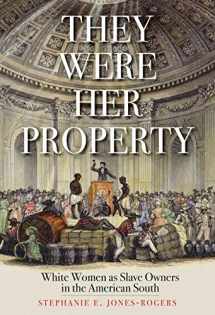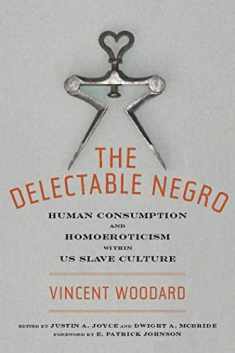
They Were Her Property: White Women as Slave Owners in the American South
ISBN-13:
9780300251838
ISBN-10:
0300251831
Edition:
Illustrated
Author:
Stephanie E. Jones-Rogers
Publication date:
2020
Publisher:
Yale University Press
Format:
Paperback
320 pages
FREE US shipping
on ALL non-marketplace orders
Marketplace
from $15.74
USD
Marketplace offers
Seller
Condition
Note
Seller
Condition
New
Brand New! Not overstocks! Brand New direct from the publisher! Ships in sturdy cardboard packaging.
Book details
ISBN-13:
9780300251838
ISBN-10:
0300251831
Edition:
Illustrated
Author:
Stephanie E. Jones-Rogers
Publication date:
2020
Publisher:
Yale University Press
Format:
Paperback
320 pages
Summary
They Were Her Property: White Women as Slave Owners in the American South (ISBN-13: 9780300251838 and ISBN-10: 0300251831), written by authors
Stephanie E. Jones-Rogers, was published by Yale University Press in 2020.
With an overall rating of 4.1 stars, it's a notable title among other
Economic History
(Economics, Black & African Americans, United States History, State & Local, Women in History, World History, Women's Studies) books. You can easily purchase or rent They Were Her Property: White Women as Slave Owners in the American South (Paperback) from BooksRun,
along with many other new and used
Economic History
books
and textbooks.
And, if you're looking to sell your copy, our current buyback offer is $1.75.
Description
A bold and searing investigation into the role of white women in the American slave economy
Bridging women’s history, the history of the South, and African American history, this book makes a bold argument about the role of white women in American slavery. Historian Stephanie E. Jones-Rogers draws on a variety of sources to show that slave‑owning women were sophisticated economic actors who directly engaged in and benefited from the South’s slave market. Because women typically inherited more slaves than land, enslaved people were often their primary source of wealth. Not only did white women often refuse to cede ownership of their slaves to their husbands, they employed management techniques that were as effective and brutal as those used by slave‑owning men. White women actively participated in the slave market, profited from it, and used it for economic and social empowerment. By examining the economically entangled lives of enslaved people and slave‑owning women, Jones-Rogers presents a narrative that forces us to rethink the economics and social conventions of slaveholding America.
Bridging women’s history, the history of the South, and African American history, this book makes a bold argument about the role of white women in American slavery. Historian Stephanie E. Jones-Rogers draws on a variety of sources to show that slave‑owning women were sophisticated economic actors who directly engaged in and benefited from the South’s slave market. Because women typically inherited more slaves than land, enslaved people were often their primary source of wealth. Not only did white women often refuse to cede ownership of their slaves to their husbands, they employed management techniques that were as effective and brutal as those used by slave‑owning men. White women actively participated in the slave market, profited from it, and used it for economic and social empowerment. By examining the economically entangled lives of enslaved people and slave‑owning women, Jones-Rogers presents a narrative that forces us to rethink the economics and social conventions of slaveholding America.


We would LOVE it if you could help us and other readers by reviewing the book
Book review

Congratulations! We have received your book review.
{user}
{createdAt}
by {truncated_author}




